英语选修课++
- 格式:doc
- 大小:25.00 KB
- 文档页数:2
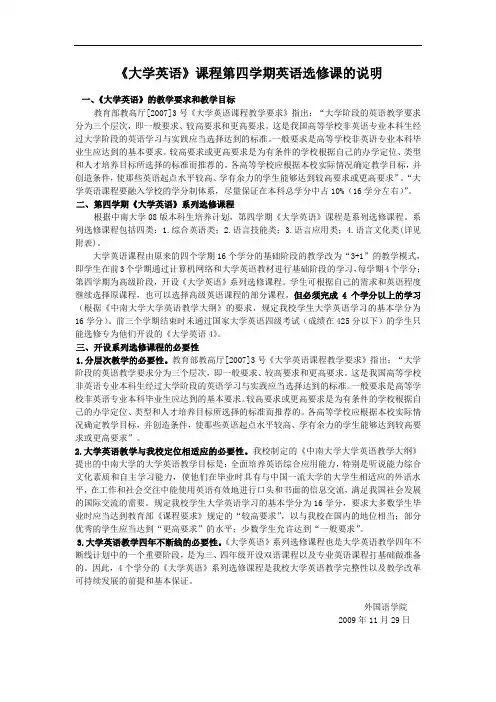
《大学英语》课程第四学期英语选修课的说明一、《大学英语》的教学要求和教学目标教育部教高厅[2007]3号《大学英语课程教学要求》指出:“大学阶段的英语教学要求分为三个层次,即一般要求、较高要求和更高要求。
这是我国高等学校非英语专业本科生经过大学阶段的英语学习与实践应当选择达到的标准。
一般要求是高等学校非英语专业本科毕业生应达到的基本要求。
较高要求或更高要求是为有条件的学校根据自己的办学定位、类型和人才培养目标所选择的标准而推荐的。
各高等学校应根据本校实际情况确定教学目标,并创造条件,使那些英语起点水平较高、学有余力的学生能够达到较高要求或更高要求”。
“大学英语课程要融入学校的学分制体系,尽量保证在本科总学分中占10%(16学分左右)”。
二、第四学期《大学英语》系列选修课程根据中南大学08版本科生培养计划,第四学期《大学英语》课程是系列选修课程。
系列选修课程包括四类:1.综合英语类;2.语言技能类;3.语言应用类;4.语言文化类(详见附表)。
大学英语课程由原来的四个学期16个学分的基础阶段的教学改为“3+1”的教学模式,即学生在前3个学期通过计算机网络和大学英语教材进行基础阶段的学习,每学期4个学分;第四学期为高级阶段,开设《大学英语》系列选修课程。
学生可根据自己的需求和英语程度继续选择原课程,也可以选择高级英语课程的部分课程,但必须完成4个学分以上的学习(根据《中南大学大学英语教学大纲》的要求,规定我校学生大学英语学习的基本学分为16学分)。
前三个学期结束时未通过国家大学英语四级考试(成绩在425分以下)的学生只能选修专为他们开设的《大学英语4》。
三、开设系列选修课程的必要性1.分层次教学的必要性。
教育部教高厅[2007]3号《大学英语课程教学要求》指出:“大学阶段的英语教学要求分为三个层次,即一般要求、较高要求和更高要求。
这是我国高等学校非英语专业本科生经过大学阶段的英语学习与实践应当选择达到的标准。
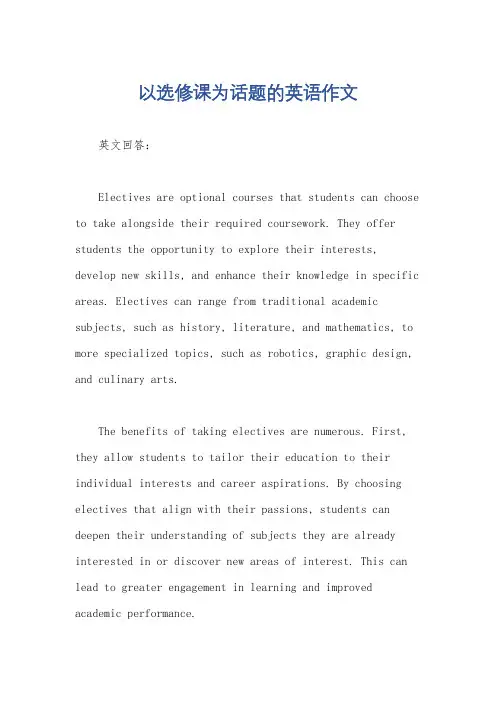
以选修课为话题的英语作文英文回答:Electives are optional courses that students can choose to take alongside their required coursework. They offer students the opportunity to explore their interests, develop new skills, and enhance their knowledge in specific areas. Electives can range from traditional academic subjects, such as history, literature, and mathematics, to more specialized topics, such as robotics, graphic design, and culinary arts.The benefits of taking electives are numerous. First, they allow students to tailor their education to their individual interests and career aspirations. By choosing electives that align with their passions, students can deepen their understanding of subjects they are already interested in or discover new areas of interest. This can lead to greater engagement in learning and improved academic performance.Second, electives provide students with the opportunity to develop new skills and abilities. For example, students who take an elective in photography may learn how to use a camera, edit photos, and create portfolios. Students who take an elective in computer programming may learn how to code, develop websites, and solve problems using technology. These skills can be valuable in both personal and professional life.Third, electives can help students expand their knowledge and understanding of the world around them. By taking electives in different disciplines, students cangain exposure to a variety of perspectives and ideas. This can help them develop a more well-rounded education and become more informed citizens.Of course, there are also some potential drawbacks to taking electives. One drawback is that they can add to the overall cost of education. Electives are often not covered by scholarships or financial aid, so students may have to pay for them out of pocket. Another drawback is thatelectives can take up valuable time that could be spent on required coursework. Students who take too many electives may find themselves struggling to keep up with their core classes.Overall, the benefits of taking electives outweigh the drawbacks. Electives provide students with the opportunityto explore their interests, develop new skills, and expand their knowledge. By choosing electives wisely, students can enhance their education and prepare themselves for successin college, career, and life.中文回答:选修课,又称选课,是学生在完成必修课之外可以选择修读的课程。
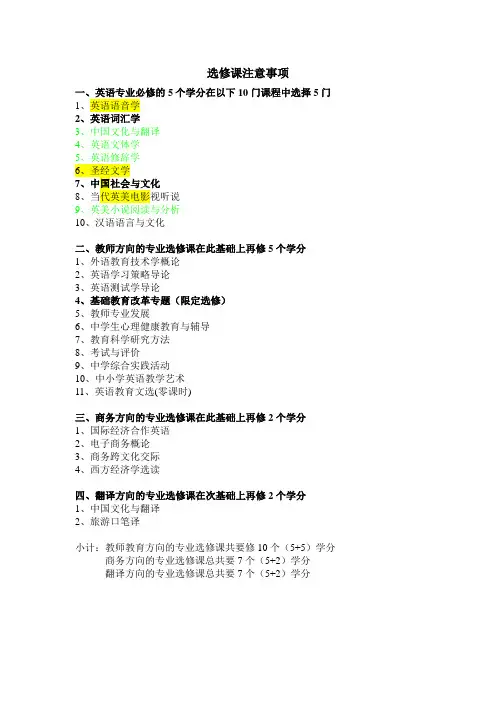
选修课注意事项
一、英语专业必修的5个学分在以下10门课程中选择5门
1、英语语音学
2、英语词汇学
3、中国文化与翻译
4、英语文体学
5、英语修辞学
6、圣经文学
7、中国社会与文化
8、当代英美电影视听说
9、英美小说阅读与分析
10、汉语语言与文化
二、教师方向的专业选修课在此基础上再修5个学分
1、外语教育技术学概论
2、英语学习策略导论
3、英语测试学导论
4、基础教育改革专题(限定选修)
5、教师专业发展
6、中学生心理健康教育与辅导
7、教育科学研究方法
8、考试与评价
9、中学综合实践活动
10、中小学英语教学艺术
11、英语教育文选(零课时)
三、商务方向的专业选修课在此基础上再修2个学分
1、国际经济合作英语
2、电子商务概论
3、商务跨文化交际
4、西方经济学选读
四、翻译方向的专业选修课在次基础上再修2个学分
1、中国文化与翻译
2、旅游口笔译
小计:教师教育方向的专业选修课共要修10个(5+5)学分商务方向的专业选修课总共要7个(5+2)学分
翻译方向的专业选修课总共要7个(5+2)学分。
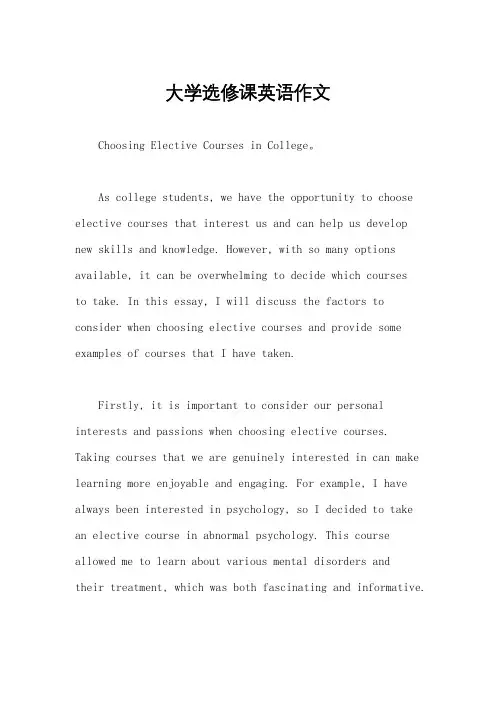
大学选修课英语作文Choosing Elective Courses in College。
As college students, we have the opportunity to choose elective courses that interest us and can help us develop new skills and knowledge. However, with so many options available, it can be overwhelming to decide which coursesto take. In this essay, I will discuss the factors to consider when choosing elective courses and provide some examples of courses that I have taken.Firstly, it is important to consider our personal interests and passions when choosing elective courses. Taking courses that we are genuinely interested in can make learning more enjoyable and engaging. For example, I have always been interested in psychology, so I decided to take an elective course in abnormal psychology. This course allowed me to learn about various mental disorders andtheir treatment, which was both fascinating and informative.Secondly, we should consider our career goals when choosing elective courses. Taking courses that are relevant to our desired career path can help us gain valuable skills and knowledge that can be applied in the workplace. For instance, I am interested in pursuing a career in marketing, so I took an elective course in digital marketing. This course taught me about various online marketing strategies and how to use social media platforms to promote products and services.Thirdly, we should consider the difficulty level of the courses we are interested in. While it is important to challenge ourselves, it is also important to choose courses that we can realistically handle. For example, I was interested in taking a course in advanced statistics, but after researching the course requirements and workload, I realized that it would be too challenging for me. Instead,I opted for a course in basic statistics, which still provided me with a solid foundation in statistical analysis.In conclusion, choosing elective courses in college requires careful consideration of our personal interests,career goals, and the difficulty level of the courses. By taking courses that align with our interests and goals, we can make the most of our college experience and develop new skills and knowledge that will benefit us in the future.。
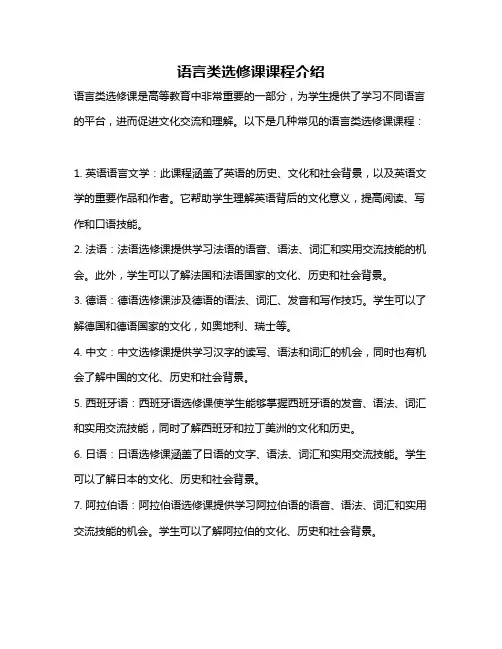
语言类选修课课程介绍
语言类选修课是高等教育中非常重要的一部分,为学生提供了学习不同语言的平台,进而促进文化交流和理解。
以下是几种常见的语言类选修课课程:
1. 英语语言文学:此课程涵盖了英语的历史、文化和社会背景,以及英语文学的重要作品和作者。
它帮助学生理解英语背后的文化意义,提高阅读、写作和口语技能。
2. 法语:法语选修课提供学习法语的语音、语法、词汇和实用交流技能的机会。
此外,学生可以了解法国和法语国家的文化、历史和社会背景。
3. 德语:德语选修课涉及德语的语法、词汇、发音和写作技巧。
学生可以了解德国和德语国家的文化,如奥地利、瑞士等。
4. 中文:中文选修课提供学习汉字的读写、语法和词汇的机会,同时也有机会了解中国的文化、历史和社会背景。
5. 西班牙语:西班牙语选修课使学生能够掌握西班牙语的发音、语法、词汇和实用交流技能,同时了解西班牙和拉丁美洲的文化和历史。
6. 日语:日语选修课涵盖了日语的文字、语法、词汇和实用交流技能。
学生可以了解日本的文化、历史和社会背景。
7. 阿拉伯语:阿拉伯语选修课提供学习阿拉伯语的语音、语法、词汇和实用交流技能的机会。
学生可以了解阿拉伯的文化、历史和社会背景。
8. 韩语:韩语选修课提供学习韩语的语音、语法、词汇和实用交流技能的机会。
学生可以了解韩国的文化、历史和社会背景。
通过语言类选修课的学习,学生不仅能够提高语言技能,还能深入了解不同的文化和社会背景,这有助于培养他们的跨文化交流能力,增强全球视野。
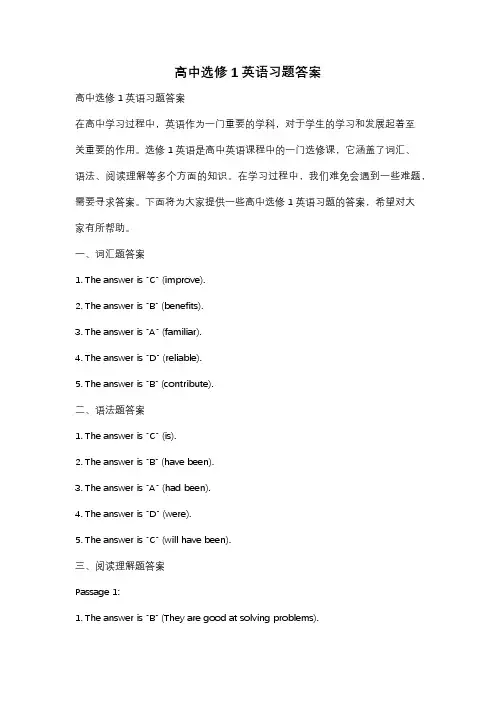
高中选修1英语习题答案高中选修1英语习题答案在高中学习过程中,英语作为一门重要的学科,对于学生的学习和发展起着至关重要的作用。
选修1英语是高中英语课程中的一门选修课,它涵盖了词汇、语法、阅读理解等多个方面的知识。
在学习过程中,我们难免会遇到一些难题,需要寻求答案。
下面将为大家提供一些高中选修1英语习题的答案,希望对大家有所帮助。
一、词汇题答案1. The answer is "C" (improve).2. The answer is "B" (benefits).3. The answer is "A" (familiar).4. The answer is "D" (reliable).5. The answer is "B" (contribute).二、语法题答案1. The answer is "C" (is).2. The answer is "B" (have been).3. The answer is "A" (had been).4. The answer is "D" (were).5. The answer is "C" (will have been).三、阅读理解题答案Passage 1:1. The answer is "B" (They are good at solving problems).2. The answer is "D" (They are independent and creative).3. The answer is "A" (They can think critically and analytically).4. The answer is "C" (They can adapt to new situations quickly).5. The answer is "D" (They can communicate effectively).Passage 2:1. The answer is "C" (To provide a brief summary of the article).2. The answer is "A" (It can cause physical and mental health problems).3. The answer is "B" (It can lead to poor academic performance).4. The answer is "D" (It can affect relationships with family and friends).5. The answer is "C" (It can result in decreased productivity).以上是一些高中选修1英语习题的答案,希望对大家的学习有所帮助。
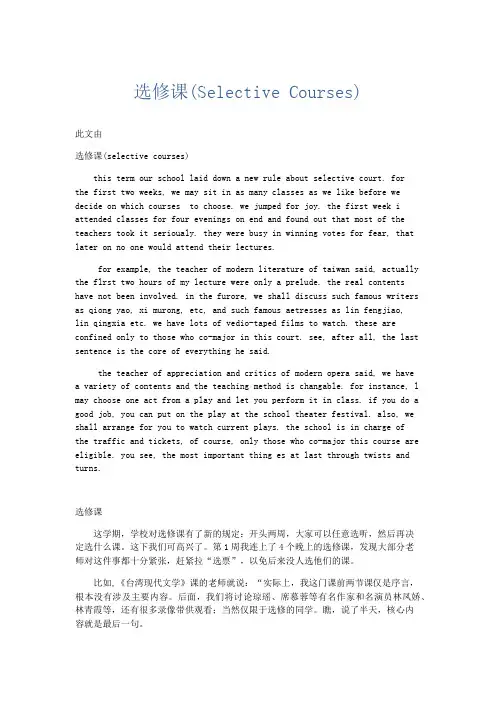
选修课(Selective Courses)此文由选修课(selective courses)this term our school laid down a new rule about selective court. forthe first two weeks, we may sit in as many classes as we like before we decide on which courses to choose. we jumped for joy. the first week i attended classes for four evenings on end and found out that most of the teachers took it serioualy. they were busy in winning votes for fear, that later on no one would attend their lectures.for example, the teacher of modern literature of taiwan said, actually the flrst two hours of my lecture were only a prelude. the real contents have not been involved. in the furore, we shall discuss such famous writers as qiong yao, xi murong, etc, and such famous aetresses as lin fengjiao,lin qingxia etc. we have lots of vedio-taped films to watch. these are confined only to those who co-major in this court. see, after all, the last sentence is the core of everything he said.the teacher of appreciation and critics of modern opera said, we havea variety of contents and the teaching method is changable. for instance, l may choose one act from a play and let you perform it in class. if you do a good job, you can put on the play at the school theater festival. also, we shall arrange for you to watch current plays. the school is in charge ofthe traffic and tickets, of course, only those who co-major this course are eligible. you see, the most important thing es at last through twists and turns.选修课这学期,学校对选修课有了新的规定:开头两周,大家可以任意选听,然后再决定选什么课。
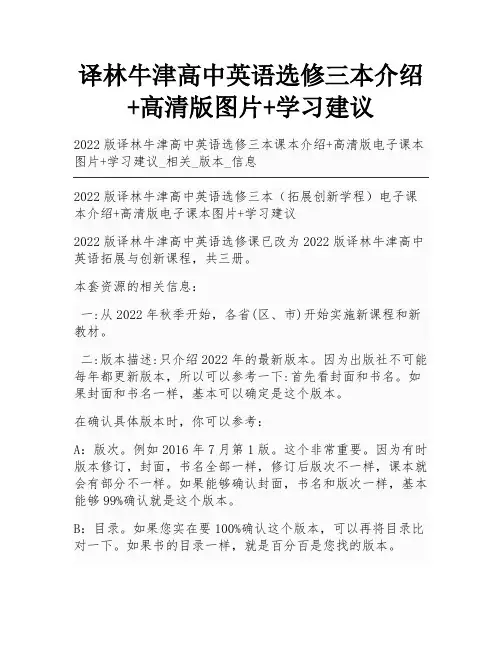
译林牛津高中英语选修三本介绍+高清版图片+学习建议2022版译林牛津高中英语选修三本课本介绍+高清版电子课本图片+学习建议_相关_版本_信息2022版译林牛津高中英语选修三本(拓展创新学程)电子课本介绍+高清版电子课本图片+学习建议2022版译林牛津高中英语选修课已改为2022版译林牛津高中英语拓展与创新课程,共三册。
本套资源的相关信息:一:从2022年秋季开始,各省(区、市)开始实施新课程和新教材。
二:版本描述:只介绍2022年的最新版本。
因为出版社不可能每年都更新版本,所以可以参考一下:首先看封面和书名。
如果封面和书名一样,基本可以确定是这个版本。
在确认具体版本时,你可以参考:A:版次。
例如2016年7月第1版。
这个非常重要。
因为有时版本修订,封面,书名全部一样,修订后版次不一样,课本就会有部分不一样。
如果能够确认封面,书名和版次一样,基本能够99%确认就是这个版本。
B:目录。
如果您实在要100%确认这个版本,可以再将目录比对一下。
如果书的目录一样,就是百分百是您找的版本。
C:相关的最新信息,你可以在相关出版社官网上查找相关信息,当然你也可以在搜狐号上搜索相关信息。
本页所有子课本图片来自美英桥精选文档网,由于上传图片数量限制,只有一部分,您可以在相关网站上查阅。
三:2022年译林牛津高中英语选修课已改为2022年译林牛津高中英语延伸与创新课程,共三本。
以下是课本的信息:一:2022版译林牛津高中英语选修一(拓展创新学程)电子课本高清版图片:二:2022版译林牛津高中英语选修二(拓展创新学程)电子课本高清版图片:三:2022版译林牛津高中英语选修三(拓展创新学程)电子课本高清版图片:。
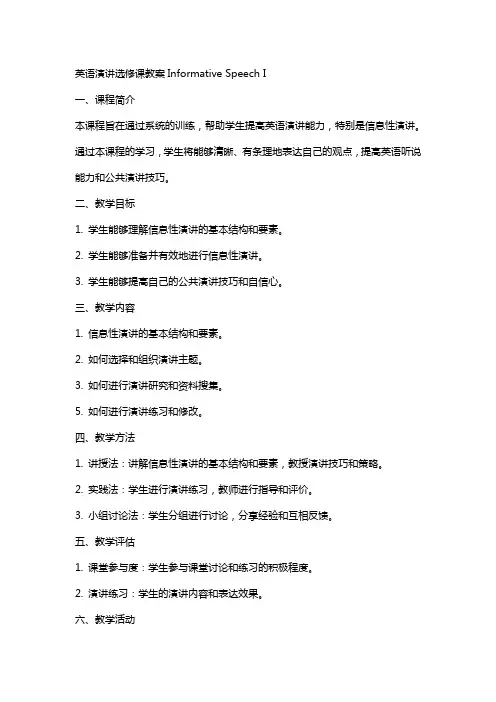
英语演讲选修课教案Informative Speech I一、课程简介本课程旨在通过系统的训练,帮助学生提高英语演讲能力,特别是信息性演讲。
通过本课程的学习,学生将能够清晰、有条理地表达自己的观点,提高英语听说能力和公共演讲技巧。
二、教学目标1. 学生能够理解信息性演讲的基本结构和要素。
2. 学生能够准备并有效地进行信息性演讲。
3. 学生能够提高自己的公共演讲技巧和自信心。
三、教学内容1. 信息性演讲的基本结构和要素。
2. 如何选择和组织演讲主题。
3. 如何进行演讲研究和资料搜集。
5. 如何进行演讲练习和修改。
四、教学方法1. 讲授法:讲解信息性演讲的基本结构和要素,教授演讲技巧和策略。
2. 实践法:学生进行演讲练习,教师进行指导和评价。
3. 小组讨论法:学生分组进行讨论,分享经验和互相反馈。
五、教学评估1. 课堂参与度:学生参与课堂讨论和练习的积极程度。
2. 演讲练习:学生的演讲内容和表达效果。
六、教学活动1. 演讲主题选择:学生根据个人兴趣和专业知识,选择一个主题进行演讲。
教师提供主题选择的建议和指导。
2. 资料搜集和整理:学生进行资料搜集,整理相关信息,构建演讲框架。
教师提供资料搜集的技巧和方法。
4. 演讲练习和修改:学生进行演讲练习,教师提供评价和修改建议。
学生根据教师的建议,进行演讲稿的修改和完善。
七、教学资源1. 教材:使用相关的英语演讲教材,提供理论和实践指导。
2. 网络资源:利用互联网资源,搜集和整理演讲相关的资料和案例。
3. 视听材料:观看和分析优秀的英语演讲视频,学习演讲技巧和表达方式。
八、教学进度安排1. 第一周:介绍信息性演讲的基本结构和要素,讲解演讲技巧和策略。
2. 第二周:选择和组织演讲主题,进行资料搜集和整理。
4. 第四周:进行小组讨论和分享,互相反馈和改进。
5. 第五周:进行课堂演讲,教师进行评价和总结。
九、教学注意事项1. 鼓励学生积极参与,充分展示自己的观点和能力。
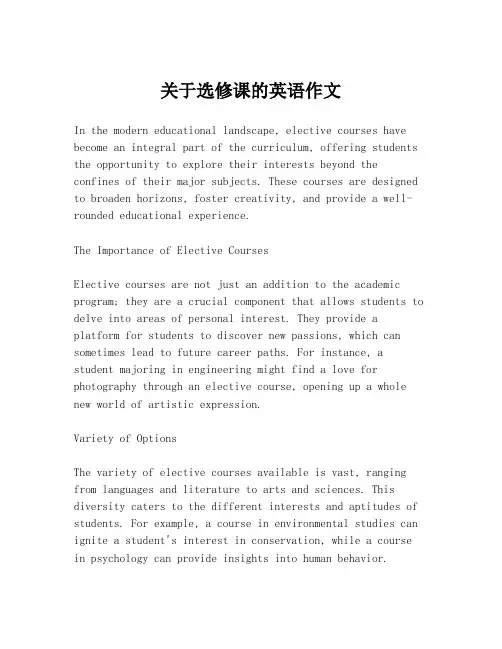
关于选修课的英语作文In the modern educational landscape, elective courses have become an integral part of the curriculum, offering students the opportunity to explore their interests beyond the confines of their major subjects. These courses are designed to broaden horizons, foster creativity, and provide a well-rounded educational experience.The Importance of Elective CoursesElective courses are not just an addition to the academic program; they are a crucial component that allows students to delve into areas of personal interest. They provide a platform for students to discover new passions, which can sometimes lead to future career paths. For instance, a student majoring in engineering might find a love for photography through an elective course, opening up a whole new world of artistic expression.Variety of OptionsThe variety of elective courses available is vast, ranging from languages and literature to arts and sciences. This diversity caters to the different interests and aptitudes of students. For example, a course in environmental studies can ignite a student's interest in conservation, while a course in psychology can provide insights into human behavior.Enhancing Skills and KnowledgeBeyond just learning new subjects, elective courses often enhance a student's critical thinking, problem-solving, and research skills. They encourage students to think outside the box and approach problems from different perspectives. For example, a course in philosophy can challenge students to question their beliefs and assumptions, fostering a deeper understanding of the world.Cultural ExposureMany elective courses offer a window into different cultures and societies. Learning a new language, for instance, is not just about acquiring linguistic skills; it's also about understanding the culture, traditions, and history of the people who speak that language. This exposure can foster a sense of global citizenship and appreciation for diversity.ConclusionIn conclusion, elective courses play a pivotal role inshaping a student's educational journey. They are not supplementary but essential for a comprehensive education. By offering a wide array of subjects, they encourage students to step out of their comfort zones, broaden their perspectives, and develop into well-rounded individuals ready to contribute to the world in meaningful ways. As such, it is highly recommended that students take advantage of the elective courses available to them, embracing the opportunity to learn, grow, and explore.。
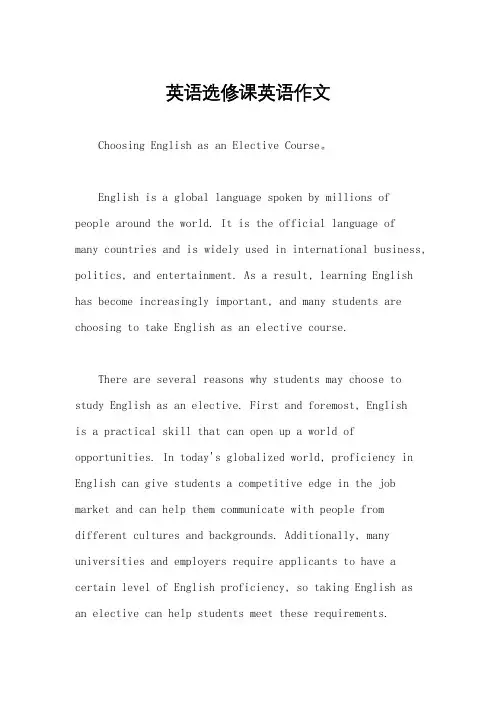
英语选修课英语作文Choosing English as an Elective Course。
English is a global language spoken by millions of people around the world. It is the official language of many countries and is widely used in international business, politics, and entertainment. As a result, learning English has become increasingly important, and many students are choosing to take English as an elective course.There are several reasons why students may choose to study English as an elective. First and foremost, Englishis a practical skill that can open up a world of opportunities. In today's globalized world, proficiency in English can give students a competitive edge in the job market and can help them communicate with people from different cultures and backgrounds. Additionally, many universities and employers require applicants to have a certain level of English proficiency, so taking English as an elective can help students meet these requirements.Furthermore, studying English can also beintellectually stimulating. English literature, for example, offers a rich and diverse body of work that can provide students with insights into different cultures, time periods, and human experiences. By reading and analyzing works of literature, students can develop critical thinking skills and gain a deeper understanding of the world around them.In addition to these practical and intellectual benefits, learning English can also be personally enriching. Many students find that studying English helps them to express themselves more effectively and confidently, bothin writing and in speaking. This can improve their communication skills and boost their self-esteem. Moreover, learning English can also provide students with a sense of accomplishment and pride as they master a new language.Of course, there are also challenges associated with studying English as an elective. For some students, English may be a difficult language to learn, especially if it isvery different from their native language. Additionally, studying English can be time-consuming and require a lot of effort and dedication. However, many students find that the rewards of studying English far outweigh the challenges.In conclusion, choosing English as an elective course can be a valuable and rewarding experience for students. Whether for practical, intellectual, or personal reasons, studying English can provide students with a range of benefits that can enrich their lives and open up new opportunities. Therefore, it is no surprise that English is one of the most popular elective courses chosen by students around the world.。
初中英语选修课教案一、教学目标1. 知识目标:(1)学生能够掌握选修课主题相关的词汇和表达方式。
(2)学生能够理解和运用选修课主题相关的语法知识。
(3)学生能够听懂、说清选修课主题的简单对话或短文。
2. 能力目标:(1)学生能够通过选修课提高英语听说读写的能力。
(2)学生能够运用英语进行简单的交流和讨论。
3. 情感目标:(1)学生能够对选修课主题产生兴趣和热情。
(2)学生能够通过选修课提高自信心和自主学习能力。
二、教学内容1. 第一课时:选修课主题介绍(1)介绍选修课的主题和目的。
(2)引导学生了解选修课的学习内容和预期目标。
2. 第二课时:词汇学习(1)教授选修课主题相关的词汇和表达方式。
(2)通过活动和练习帮助学生巩固词汇。
3. 第三课时:语法学习(1)教授选修课主题相关的语法知识。
(2)通过例句和练习帮助学生理解和运用语法知识。
4. 第四课时:听力训练(1)播放与选修课主题相关的对话或短文。
(2)引导学生听懂并理解对话或短文的内容。
5. 第五课时:口语练习(1)组织学生进行选修课主题的对话练习。
(2)鼓励学生大胆开口,提高口语表达能力。
三、教学方法1. 交际法:通过模拟真实情境,引导学生进行听、说、读、写的实际操作,提高学生的交际能力。
2. 任务型教学法:通过完成各种任务,激发学生的学习兴趣,培养学生的自主学习能力。
3. 小组合作学习:鼓励学生进行小组讨论和合作,提高学生的团队协作能力。
四、教学评价1. 平时表现评价:观察学生在课堂上的参与程度、听说读写能力的运用情况,以及学生的学习态度和合作精神。
2. 单元测试评价:定期进行单元测试,评估学生对选修课主题相关词汇、语法、听力、口语的掌握程度。
3. 总结性评价:在课程结束时进行总结性评价,全面评估学生对选修课的学习成果。
五、教学资源1. 教材:选用适合初中生的选修课教材,提供丰富的学习内容。
2. 多媒体教学设备:利用多媒体课件、音频、视频等资源,增加课堂教学的趣味性和互动性。
高中英语选修课1. 课程简介高中英语选修课是为提高学生英语能力和拓宽英语知识面而开设的一门选修课程。
通过本课程的学习,学生将能够提升英语听、说、读、写的能力,丰富词汇量,掌握基本的语法和句型结构,并能够理解和运用一定的英语表达技巧。
2. 课程目标•提高学生英语听说能力,培养流利的口语表达能力;•培养学生英语阅读能力,理解并运用各类文本的技巧;•培养学生写作能力,掌握英语写作的基本技巧;•拓宽学生的英语知识面,了解英语国家的文化特点和社会现象。
3. 课程内容3.1 口语表达本部分主要包括以下内容:•日常交际用语的学习和练习;•各类口语题材讨论,包括个人经历、社会问题等;•英语演讲技巧的培养。
3.2 阅读理解本部分主要包括以下内容:•不同题材的英文文章阅读与理解;•阅读技巧训练,如扫读、略读和详读;•利用课堂时间进行文本分析和讨论。
3.3 写作技巧本部分主要包括以下内容:•英语写作基本结构和常用句型的掌握;•书信、应用文、议论文等不同类型写作的训练;•作文批改和修改。
3.4 文化与社会本部分主要包括以下内容:•英语国家的文化习俗、传统节日等的了解;•英语国家的社会现象和问题的讨论;•文化差异对沟通和交流的影响。
4. 评分标准学生的成绩将根据以下几个方面进行评估:•口语表达能力的发展程度;•阅读理解和阅读技巧的应用;•写作技巧和语言表达的准确性;•文化和社会方面的思考和表达能力。
5. 学习方法•注意课堂上的积极参与,多与同学进行口语练习和交流;•多听英文广播、新闻以及观看英文电影和纪录片;•多阅读英文杂志、报纸和原版英文书籍,提高阅读能力和词汇量;•坚持写日记、写作业并寻求老师的帮助和指导。
6. 总结高中英语选修课是一门提高学生英语能力和丰富英语知识的重要课程。
通过该课程的学习,学生能够在口语、阅读、写作和文化方面得到全面提升,为将来的学习和工作打下坚实的基础。
为了取得好成绩,学生需要积极参与课堂和课后的学习活动,坚持学习并将所学的知识应用到实际中。
2023年高中英语选修课考试大纲考试科目:高中英语选修课适用年级:高一、高二、高三一、考试目标本次考试旨在全面评估学生在选修课程中掌握的英语语言能力和相关知识。
具体目标如下:1.听力技能:能够听懂各类英语语音材料,并从中获取关键信息。
2.口语表达:能够流利、自信地运用英语进行口语表达,包括对话、演讲等。
3.阅读理解:能够独立阅读和理解各类英语文本,包括短篇文章、长篇阅读材料等。
4.写作能力:能够准确、连贯地表达自己的观点,并运用合适的语言结构和词汇。
5.语法知识:准确理解并运用各类语法结构,包括时态、语态、动词时态等。
二、考试题型及分数权重本次考试将采用综合性的考试题型,旨在全面评估学生的英语综合能力。
具体题型及分数权重如下:1.听力理解(占总分的20%):根据听到的录音,回答相关问题;听力材料分为听力短对话和听力长对话两种类型。
2.口语表达(占总分的20%):根据题目要求,自由表达指定的话题,表达清晰、流利、有逻辑性。
3.阅读理解(占总分的30%):阅读短文或文章,回答相关问题;阅读材料包括新闻报道、科技文章、社论等。
4.写作能力(占总分的25%):根据题目要求,撰写短文或作文,表述准确、连贯、有逻辑性。
5.语法知识(占总分的5%):根据题目要求,选择正确的语法结构填空或改错。
三、考试内容考试内容包括以下几个方面:1.听力理解:主要涉及日常生活对话、学校课程安排、社交活动等相关话题。
2.口语表达:根据题目要求,围绕学校生活、社会热点话题等进行口头表达。
3.阅读理解:包括短篇文章、新闻报道、科技文章等,涉及多个主题领域,如教育、环境、科技等。
4.写作能力:选择合适的题目进行写作,如书信、演讲稿、文章等,鼓励学生发挥自己的想象力和创造力。
5.语法知识:侧重于英语基本语法结构的理解和正确运用,如时态、语态、动词时态等。
四、考试要求为了更好地评估学生的综合能力,本次考试对于考试形式和要求有以下要求:1.考试时间:全卷考试时间为120分钟,听力部分约占25分钟,口语表达约占15分钟,阅读理解约占40分钟,写作能力约占30分钟,语法知识约占10分钟。
初中英语选修课教案一、教学目标1. 知识目标:(1)学生能够掌握选修课中所涉及的新词汇和短语。
(2)学生能够运用所学的语法知识进行简单的句子构建。
(3)学生能够听懂并能够运用选修课中所学的日常用语进行交流。
2. 能力目标:(1)学生能够通过阅读和听力练习,提高获取信息的能力。
(2)学生能够通过口语练习,提高表达自己的观点和情感的能力。
(3)学生能够通过写作练习,提高运用英语进行写作的能力。
3. 情感目标:(1)学生能够积极参与课堂活动,提高学习英语的兴趣。
(2)学生能够增强自信心,勇于开口说英语。
二、教学内容1. 第一单元:Introduction and Dly Routine(1)学习新词汇和短语:morning, afternoon, evening, breakfast, lunch, dinner, brush my teeth, take a shower, go to school, e home, watch TV, read a book, go to bed。
(2)学习语法:一般现在时。
(3)口语练习:用一般现在时描述自己的日常作息。
2. 第二单元:Family and Friends(1)学习新词汇和短语:family, mother, father, sister, brother, friend,grandma, grandpa, uncle, aunt。
(2)学习语法:名词所有格。
(3)口语练习:介绍自己的家庭成员和朋友。
3. 第三单元:Places and Locations(1)学习新词汇和短语:place, city, country, park, school, library, hospital, restaurant, supermarket。
(2)学习语法:一般现在时。
(3)口语练习:用一般现在时描述自己喜欢的地点。
4. 第四单元:Hobbies and Interests(1)学习新词汇和短语:hob, interest, read, write, draw, listen to music, play sports, watch movies。
高中英语选修课1. 介绍高中英语选修课是在高中阶段为学生提供更加专业和深入的英语学习课程。
这些选修课的设置旨在帮助学生进一步提高他们的英语能力,培养他们的语言技能和文化意识。
2. 选修课种类高中英语选修课通常包含多种不同的课程,以满足学生的不同兴趣和需求。
以下是一些常见的高中英语选修课种类:2.1 英语阅读与写作英语阅读与写作选修课旨在培养学生的阅读和写作能力。
课程内容包括阅读理解、写作技巧、词汇扩展和语法知识的强化。
通过阅读和写作的实践,学生可以提高他们的英语表达能力和思维能力。
2.2 英美文学英美文学选修课主要介绍英美文学经典作品和作家。
通过学习文学作品,学生可以了解英美文学的发展历程,深入了解作家的创作背景和文化价值观。
此外,学生还可以通过阅读和分析文学作品,提高他们的阅读理解和文学鉴赏能力。
2.3 英语演讲与辩论英语演讲与辩论选修课旨在培养学生的口语表达和辩论能力。
课程内容包括演讲技巧、辩论技巧和口语表达训练。
通过参与演讲和辩论活动,学生可以提高他们的口语流利度和逻辑思维能力。
2.4 跨文化交流跨文化交流选修课主要介绍不同国家和文化背景之间的差异和联系。
课程内容包括跨文化沟通技巧、跨文化意识培养和跨文化交际实践。
通过学习跨文化交流,学生可以拓宽自己的视野,增进与不同文化背景人们的理解和尊重。
3. 选修课的目标与意义高中英语选修课的目标是提高学生的英语语言能力,培养他们的语言技能和文化意识。
这些选修课的意义在于:•帮助学生更好地应对高中英语考试和英语能力评估;•拓宽学生的英语知识面,提高他们的英语综合能力;•培养学生的独立学习能力和批判性思维能力;•增强学生对英语语言和文化的兴趣和热爱;•为学生未来的学术和职业发展打下基础。
4. 选修课的教学方法高中英语选修课采用多种教学方法,以促进学生的全面发展和有效学习。
一些常见的教学方法包括:•授课讲解:教师通过讲解和解读文本来引导学生理解和掌握课程内容;•小组讨论:学生以小组形式进行问题讨论,培养他们的合作能力和社交能力;•阅读与分析:学生通过阅读和分析文学作品或文本,提高他们的阅读理解和分析能力;•演讲与辩论:学生参与演讲和辩论活动,提高他们的口头表达和思辨能力;•实践与体验:学生通过实践和体验活动,加深对文化差异和语言应用的理解;5. 选修课的评估方式高中英语选修课的评估方式主要包括考试和课程作业。
以下几点非常重要,对大家顺利通过英语选修课很有帮助。
请大家务必看一看。
1、英语选修课的考核要求是:统考通过+平时作业合格。
2、如果英语选修课未通过,今后可以继续学习网络课程。
直到选修课通过为止。
重修不需要付费。
3、英语选修课只有平时作业,没有期末作业。
4. 平时作业只有1次提交机会,请同学们在完成在线练习的时候务必认真完成。
5. 如果统考未通过,下次补考时,平时作业仍有效,不需要重新提交。
6. 问:怎么找不到作业,在哪里提交?
答:《英语统考》选修课的作业为在线测试形式,请学生进入“练习与测验”中完成在线练习。
7. 免考的同学需要提交平时作业,选修课才能通过。
8. 如何复习英语:英语统考和网络课的难度相当。
所以把网络课学好,相关的练习多做几遍,如章节测试和预测题。
认真学习公共英语一、二、三。
平时多读、多背、多听教材里的单词、词组和范文。
统考频道中的复习资料,有多套模拟题,可供大家练习。
9. 教材是《全国网络教育统考辅导教程—大学英语B》上海教育音像出版社,沈金荣、卫华主编。
可在各站
点购买或到出版社邮购。